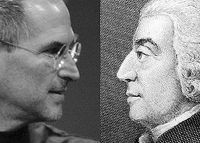What Drove Steve Jobs to Make a "Dent?" An Essay From 1776 May Have the Answer
 In a PBS special circa 1986, Steve Jobs and his fledgling Next organization were profiled. One brief segment sure to stand out to those who've studied economics appears when Jobs waxes poetic on specialization, e.g. division of labor. It appears in the context of the question "What is it that drives him?" The answer provided is his need to "contribute to history". Jobs described it this way (emphasis mine):
In a PBS special circa 1986, Steve Jobs and his fledgling Next organization were profiled. One brief segment sure to stand out to those who've studied economics appears when Jobs waxes poetic on specialization, e.g. division of labor. It appears in the context of the question "What is it that drives him?" The answer provided is his need to "contribute to history". Jobs described it this way (emphasis mine):
"I felt it the first time when I visited a school, it had 3rd and 4th graders, a classroom, one time, they had a whole classroom full of Apple II’s and I spent a few hours and I saw these 3rd and 4th graders growing up completely different than I grew up because of this machine. And what hit me about it was that:Here was a machine, that a very few people designed, and they gave it to people who didn’t know how to design it, but they knew how to make it, to manufacture it – they could make a whole bunch of them – then they gave it to some people who didn’t know how to design it or manufacture it, but they knew how to distribute it. Then they gave it to some people who didn’t know how to design, manufacture, or distribute it, but they knew how to write software for it.Gradually, this sort of inverse pyramid grew and when it finally got into the hands of a lot of people, it blossomed, out of this tiny little seed. It seemed like an incredible amount of leverage. And it all started with just an idea. And here was this idea, taken through all of these stages, resulting in a classroom full of kids growing up with some insights and some fundamentally different experiences which I thought might be very beneficial to their lives. Because of this germ of an idea a couple years ago.And that’s an incredible feeling. To know that A) you had something to do with it and B) to know that it can be done. You can plant something in the world, and it’ll grow, and change the world, ever so slightly."
Watch it here.This passage strongly echoes Adam Smith's 1776 description of the stunning productivity he witnessed in his famous "pin factory" example in The Wealth of Nations:
"Each person, therefore, making a tenth part of forty-eight thousand pins, might be considered as making four thousand eight hundred pins in a day. But if they had all wrought separately and independently, and without any of them having been educated to this peculiar business, they certainly could not each of them have made twenty, perhaps not one pin in a day; that is, certainly, not the two hundred and fortieth, perhaps not the four thousand eight hundredth part of what they are at present capable of performing, in consequence of a proper division and combination of their different operations."
This economic theme was reinforced in 1958 in the famous "I pencil" essay by Leonard Read. The central idea espoused by the pencil is:
"not a single person on the face of this earth knows how to make me."
More recently, Thomas Thwaites depicted the wonders of specialization in his Toaster Project. Video here.
